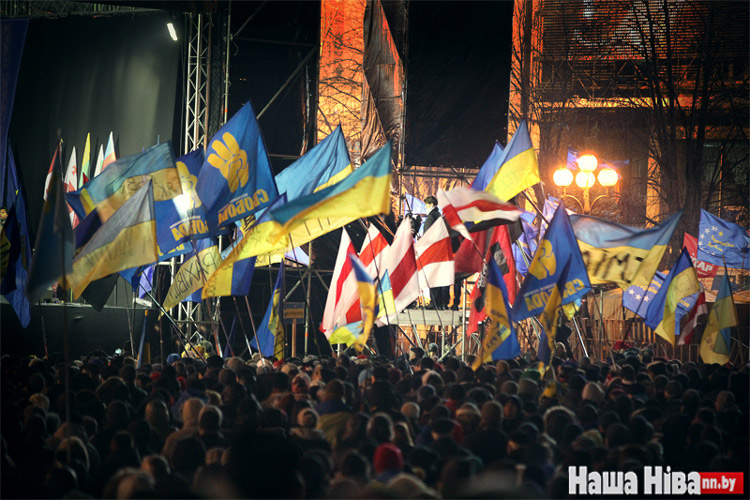Vitaliy Portnikov: First Belarus, then Russia will follow after Ukraine
- 7.02.2014, 17:33
- 9,891
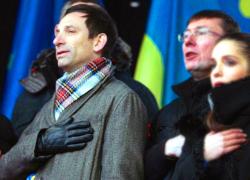
The famous journalist is convinced: Lukashenka has very little time left.
Ukrainian journalist and publicist Vitaliy Portnikov had to flee Ukraine when the powers exposed him to pressure, threats and chase. Portnikov has written a number of articles about Maidan and was one of its participants.
“Our neighbors Belarusians have been living in fear for the past 20 years. I have written a lot about it, but until today I didn’t realize what it is like,” the journalist said after another night storm of Maidan.
After Vitaliy Portnikov had to flee Ukraine, he came to Warsaw where he has been staying for one week. The journalist met with editor-in-chief of charter97.org Natallia Radzina.
- I understand what you are feeling right now. I myself had to escape from Belarus after prison, not long before that founder of our website Aleg Biabienin had been murdered. How serious is it in Ukraine? Have the powers embarked on plain bandit methods, like in Belarus?
- Indeed, they have. When I left Kyiv, I knew nothing about what happened to Igor Lutsenko, member of the Rada of All-Ukrainian Union Maidan who, luckily, survived tortures and psychological pressure. I saw him on TV after the assault, and the view struck me. I knew him as a young healthy man full of life, but these bustards have made terrible things to him. Yuriy Verbitskiy who had been kidnapped with Igor was murdered in the woods.
There are more examples: disappearance of Dmitri Bulatov, one of the leaders of Avtomaidan; threats against journalist Mustafa Nainem; attempted kidnapping of editor of the website Left Coast Andrei Yanitski. But they all are famous people. Nobody knows how many activists are being kidnapped, thrown to prison, found dead in the woods around Kyiv and other cities.
The powers have evidently done the most terrible thing: they have legalized banditry. Now the police support bandits, and you don’t know if you can ask a policeman for help when bandits are attacking.
One of the most hideous nights in Kyiv’s history was when people had to organize in units to resist bandits that terrorized the city. The so-called “titushki” raided the capital’s districts, burnt cars and assaulted people. So yes, we can definitely say that the powers are working with real bandits.
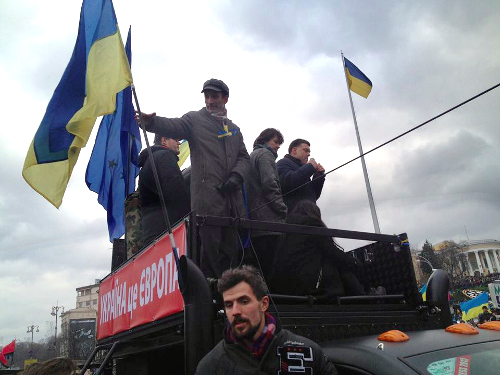
- What is it like for our colleagues, Ukrainian journalists, to work today?
- No independent honest person is secure in this country today. First of all, journalists cannot work in conflict areas. They are deliberately assaulted. They were deliberately beaten up in Bankovaya Street, in Grushevski Street, and if you say you’re a journalist you can count on being assaulted by the “law enforcers”.
It is getting worse. The new instructions for journalists recommend never to say they work for the media. This is very cynical. It seems that the powers are trying to show us that they are unstoppable.
For example, the US International Broadcasting made a special statement regarding me and a Voice of America journalist who, too, has been exposed to pressure. And what do you think happened? The following day journalists of Radio Svaboda were beaten up in direct broadcast.
Afterwards I met with ambassadors of the EU and US and told them about the reaction of the Ukrainian powers to the US official statements. It must have been the last drop. The next morning, my apartment was stormed by strangers. I don’t know what they had in mind: kidnapping, assault, murder. Before that I had been informed that I crossed the limit when I spoke to the diplomats about target sanctions against officials.
- I’m not going to ask you about your escape. I know it wasn’t easy. What have you been doing this one week upon your arrival to Warsaw?
- I saw that Poland has a very vague idea of what is going on in Ukraine. There is a strong interest, huge interest, but there is no understanding of what has been happening to the Ukrainian people during the recent months.
That might be the reason as to why the Ukrainians lack the international support they deserve. I am beginning to think that we did make a mistake of not working properly with the international community. We just don’t have enough resources for everything… But we must talk to people in other countries.
In Warsaw I am meeting with numerous colleagues, politicians and political scientists. They often ask if I realize that the victory of the protest movement implies profound reforms that the nation is not ready for. When I say the nation is ready, they don’t believe me.
I ask, how ready they were themselves. “We had Solidarnosc”, they tell me. And we have Maidan, the people who are prepared to fight! This is not the “carnival” of 2004, the people will survive any reforms.
Unfortunately, Poland sees Ukraine as it used to be for three-four months ago, when the nation counted on the leader, some sort of a messiah, and wasn’t ready to take responsibility for their country’s future. And Poland doesn’t understand what to do with the new Ukraine.
- The new party Svoboda must raise many questions, too.
- Yes, this is true. Most of the questions that I get are about the party, because I am standing side by side with Oleg Tagnibok – although I am a Jew.
And I do that with great pleasure, because Oleg wants Ukraine to be a part of the European Union. All leading activists of Svoboda, who together with their voters support European values, say that. And the most important thing is that this party is prepared to be incorporated into the system of values that exists in Europe, which means that it is ready to act in the framework of similar EU parties.
Presently Svoboda is acting in a very decent way, and I see no problem there. Right-wing parties function in every European country.
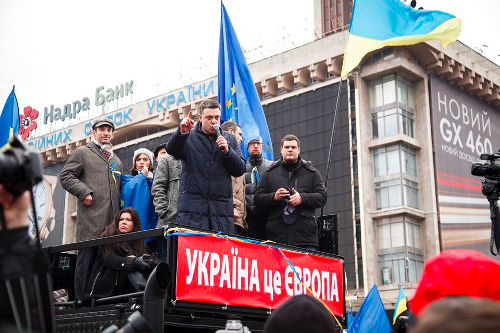
- Let’s talk about the recent events in Ukraine. Under Maidan’s pressure the Superior Rada cancelled “the law of January 16”, Azarov finally resigned. You said it was a mere “maneuver for envoys”. In other words, the powers have not made any real concession?
- Not yet. The fact that the “laws on dictatorship” were cancelled reminds me of the old anecdote about a cow that an artist painted in an industrial landscape because he wanted the commission who would analyze the painting to disapprove of the cow and tell him to remove it. When he removes the cow, what is left is the landscape.
Even before the “laws on the dictatorship” we lived in a lawless country, basically in an emergency state where courts, police and public prosecution are controlled by the government. These laws added legitimacy to the lawlessness, but in fact they changed nothing. Before people were thrown to prison, too, but on other charges.
I am glad that these laws have been cancelled, but without a reform of the powers the situation in the country cannot stabilize. That is why I said that a protest movement should grow and become stronger until actual reforms take place.
- Why hasn’t the opposition accepted the proposal to preside in the government?
- In the situation when the authority to form government belongs entirely to the president, this proposal was just a trap for Yatseniuk and Klichko. What is the point of being the prime minister who can be fired by the president at any time and who will never have the parliamentarian majority? What will such a prime minister do?
It would be a good thing for our politicians for three months ago, because the position of the prime minister granted access to financial flows, but now it is a completely different position. Today it won’t change anything.
- Do you see a solution? Maybe preterm elections of the Superior Rada and President?
- I can’t see how this can be a solution. With the current electoral legislation, rooks can win new elections. I suggest restoring the legal framework of the Constitution 2004, creating a strong coalition-based government supported by the parliamentarian majority and re-formatting the Constitutional and Superior courts. Interior minister, minister of defense, attorney general and chair of the security service should be appointed in agreement with the parliament.
These can be the first steps. Naturally, everyone who has been detained for taking part in the protest rallies should be released with no risk of resumed persecution. Bandits should leave our streets, repressions should stop. And only then can we discuss new laws: one on presidential elections that would make falsifications unfeasible, and the other on parliamentary elections that would eliminate the possibility of creating a pseudo-majority in the parliament.
Political forces from the opposition have got most votes during the recent parliamentary elections with party lists. A fraud with majority districts created a pseudo-majority that has brought the country to a collapse. We must eliminate this electoral system, we need open party lists for people to see who they vote for.
Another crucial point is the association agreement with the European Union that the new prime minister should sign within the nearest month. This issue, and with it – the relations with Russia, needs a closure.
- What can help these reforms?
- We need negotiations that involve Viktor Yanukovich himself and deputies from the majority, while the protest movement should remain active in order to keep the discussion of reforming of the powers alive.
At the same time we should work with the Europeans, we need target sanctions. I urged Ukrainians from all countries of the world to work with their parliaments and governments. It means one simple thing: each EU country should make a list of persons that are not welcome within its borders, which will close the door to all EU countries. As soon as these visa sanctions come into effect at least against several people, all other will realize that they can lose access to their villas, universities where their children study, bank accounts and the life that they considered normal. Officials will have to make a choice.
Of course, one could argue about efficiency of the sanctions in Belarus, but your parliament cannot take decisions or affect the life in the country. Obviously, visa sanctions are not very effective in a country where destroyed parliamentary system. We do remember what Lukashenka did to the Superior Council of the Republic of Belarus in 1996, when Russia kept distance and even supported him.
It is still different in Ukraine. The Superior Rada still exists and functions as a legitimate institution that the president has to cooperate with. Deputies and oligarchs don’t want to be treated as their Belarusian colleagues were. Your officials are from the USSR, they live in Belarus. Our officials, deputies and oligarchs spend most of their time in Monte-Carlo, Sardinia or Austria. In Ukraine they are mere Gastarbeiter who come to earn some money for a ski trip to Insbruk. If banned from entering the EU, they will have to ski in Krasnaya Poliana, go fishing to the Shatskiye Lakes and stroll in Minsk instead of Paris. I doubt they’ll like it.
- Is there a risk that the situation will result in a civil war and split for Ukraine?
- There will be no civil war because our nation has no separate groups that would start an armed conflict with each other. For that, people in Eastern Ukraine need to be ready to die for the Party of Regions and its leader, and I don’t know such people.
I admit that Viktor Yanukovich has supporters in the east. But they mostly belong to a politically passive group. I would say that the process of the modern Ukrainians nation’s formation stopped right in front of the borders of Eastern Ukraine. But as we can see today, the process has reached even eastern Ukrainian cities. There is nothing that indicates a beginning of a civil war.
However, the incumbent powers can force a split of Ukraine. They can flee from Kyiv to Kharkiv or Donetsk if they get Moscow’s support. But they will never get the support of the Ukrainian people. The powers will have to use force to remain in eastern Ukraine.
I do regret (and I will probably write about it in the near future) that the Ukrainian society hasn’t realized how crucial it is to join NATO. This regime which basically is an occupation of the country would have never happened had we been a NATO member. The economic occupation, Putin’s pressure, the “fifth column” – all of that would have never happened. Our people have always been frightened by NATO, as if it could destroy our relations with Russia and put us in a bad situation. Well, what do we have now? – Street fights.
- You are probably the only Ukrainian observer who writes about Belarus and who knows what is happening in Belarus. Why don’t other analysts and journalists write about Belarus? They are focused on Russia, their relations with Russia, sometimes when they need to appeal to Europe they recall it. But there is no real conversation about what has been happening and what is happening today between our countries. Let me give you an example. Ukraine betrayed us once, when after Maidan 2004, supported by lots of Belarusians, Yushchenko became Lukashenka’s lobbyist in Europe – which was completely ignored in Ukraine.
- It hurts me to think that one of the first victims of the present Ukrainian protest was a Belarusian boy. It speaks volumes. When I was at Euromaidan, I saw lots of Belarusian flags, something I mentioned in my speeches, and as far as I could say my appeals to Belarusian and Russian neighbors annoyed Moscow. Moscow will avoid spreading of the protest in Russia and Belarus.
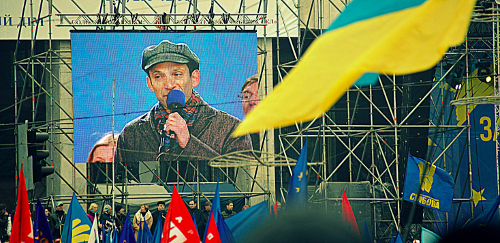
But there is a myth (that, unfortunately, has existed since the soviet times) that we live in isolated societies. Ukraine doesn’t take any interest not only in Belarus but in the rest of the world. Neither common people nor political opposition have the tradition of taking interest in the outer world. This is a devastating heritage from the Russian Empire that taught the population of its outskirts to think that there exist only their own problems, that they only should be occupied with their lives because they don’t decide anything. I wish there had been more understanding that we can learn from others’ mistakes, and that others’ experience is very valuable.
Very often, when I write about Belarus, Poland or Russia, people ask me via social media why I waste my time talking about these issues when we have so many unresolved problems. But I am convinced that interest in the world is a measure of society’s maturity. The Ukrainian society becomes more and more mature, and the interest in the world will come later.
For me, Belarus has always been a part of the civilizational paradigm.
- What do you think of Europe’s action before the Vilnius Summit of the Eastern Partnership and during Maidan and its attempts to reach an agreement with Yanukovich?
- The eastern politics of the European Union has born a terrific loss. I am convinced that the very idea of reaching an agreement with Yanukovich at any cost via concessions from Europe’s side is the reason as to why we have got this situation. I don’t mean the power phase of the protest, but the way Yanukovich refused to sign the agreement with the EU.
The EU must be a strong actor on this stage, not a formation guided by obscure reasons with a purpose to sign an agreement with Ukraine at any cost. There was a fairly strict list of demands from the EU that included liberation of Yulia Tymoshenko. In my view, Yanukovich’s refusal to accept these terms made all high-level contacts and appeals excess. And it was utterly naïve to hope that the Ukrainian president would sign the agreement if Europeans refuse from their demands. It just demonstrated that the European Union has no understanding of post-soviet reality.
Presently I see no intention to analyze the mistakes because the European Union still counts on reaching an agreement with Yanukovich – a completely hopeless idea until he hold the entire power in his hands. The EU and Yanukovich live in two parallel civilizational dimensions. I am deeply convinced that the EU should teach the Ukrainian leadership a lesson about values.
The Ukrainian people who are coming to the streets of Kyiv and other cities share these values and are demonstrating to Europe that they are ready to die for them. But suddenly it turned out that European bureaucrats and numerous politicians prioritize their geopolitical games much more than these values – a very poor service for Europe and our common future.
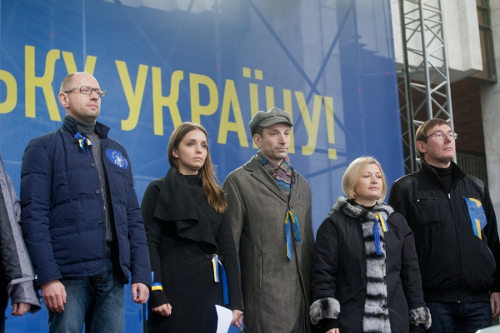
- Today many people are talking about the “lukashenkation” of Ukraine and Russia. One of the reasons behind this phenomenon is the passivity of the West regarding these 20 years of Lukashenka’s dictatorship marked by repressions and retention of the power by force. How can we reach European bureaucrats, how can we make them wake up and start to act?
- Belarus is a small country where Lukashenka’s regime succeeded not only because the West has been passive, but also because of financial help from Russia. As for Ukraine, they said that Russia’s money would never be enough to support stability there.
But in fact, these regimes have little time left. Already in 1991, after the former soviet republics became independent, I invented a very simple formula: regimes that refuse from significant economic, political and social reforms, exist only as long as there is enough old soviet resources to consume. After some discussions with economists I concluded that this time lasts for 20-25 years.
The first country to completely deplete its post-soviet material resources was Georgia. The Georgian state was destroyed when the people no longer could bribe even road police. There were road policemen who wanted to get bribes, but the people had no money to give bribes. For me, it was a symbol of the end, because corruption systems always die when it cannot reproduce those who give money.
This is exactly what is happening in Ukraine. And soon it should come to Belarus.
Ukraine is first on this path, Belarus will be second, then Russia. I believe that Putin’s model will collapse after 2014, when the threshold of oil prices changes and Iran with its huge volumes of oil enters the market, the Iranian instability will end and even the OPEC will not be able to keep the prices steady. Even now this model is undergoing profound and turbulent changes.
It will become obvious after the Olympics in Sochi because this model’s stability is tightly linked to the intention to create Potiomkin’s villages in the Caucasus region during the winter Olympics. 25 years are soon gone. In 2014, it will be 23. There is no chance to survive.
Today we should think not only how we can work with the West, but also what will come after this model is gone. There is a good chance that a decent state of citizens will be created in Ukraine, because, in my view, today we are having a revolution of citizens.
It is very important to educate Belarusian, to keep them away from this mental fear of the coming economic shock. It is crucial that they realize that the Belarusian economy will be reformatted in a toughest way. But basically Belarus will have a good future.
As for Russia, it has accumulated a great number of unsolvable problems and sorrows during Putin’s rule: economic degradation that turned Russia into an oil-appendix of the modern world; social degradation that has produced numerous paternalists; the ethnic challenge. The powers have done everything possible to kill the fetus of tolerance towards anything in the Russian society, and today this is a country of angry people: everyone has an enemy. So I have big doubts about the very idea of survival of Putin’s regime, or the Russian Federation in general.
